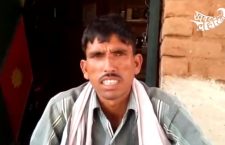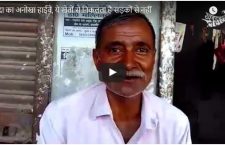In which Gulabi Gang Commander Sampat Pal hijacked our Facebook Live proceedings and a grown man shed tears.
At first, we wondered why it felt so liberating, cathartic, much-needed, seeing how it was partly annoying too. We had organized a Facebook Live in Banda on the plight of the Bundelkhand farmers – a natural progression from our reporting on their issues, which we’ve been doing since forever – in solidarity with our kisaan brethren in Madhya Pradesh and Maharashtra who are protesting, screaming, shouting and killing themselves, only in order to be heard. (And some of those who aren’t choosing suicide but justice, are ending up dead too.)
Having chosen a relatively quiet spot – ironically, the local galla mandi served as the best venue, which should, in an ideal world, be a bustling place of activity and buying-selling-weighing for farmers – the Khabar Lahariya Editor Meera Jatav sat down with local activists Uma Kushwaha and Santosh Kushwaha and Sampat Pal of the pink gang fame – erstwhile chunaavi heavy-weight, as the SP-Congress candidate from Manikpur, Chitrakoot. There was a stray dog or two to shoo away, sure, but we had started on time, and we were on track. The questions from our audience were flowing in, the finer nuances of any possible technical glitches – always iffy in network-uncertain rural U.P. – had been smoothened out, and the discussion was moving along in a productive, even and structured manner. Suicides and protests, loan-waive-offs and their ineffectuality had been talked about, and there was a lot of think-pout loud around what other possible solutions there are or could be to the perpetual misery that this country’s farmers find themselves in.
And then it happened. Towards the end of what had been a heated debate, we had Panellist A take offence at one of the points raised by Panellist B, which then led to a complete takeover of the discussion by Panellist A.
We know what you’re thinking. So, what else is new? This is the very stuff of most TV debates, after all. It is meant for them TRP’s/eyeballs.
But this felt different.
We didn’t have to go back to our courses in deconstruction theory to figure out why. The big, perhaps the only reason, why this felt new, different, even exciting, was that it had brought to the fore those big, hairy questions of gender we deal with every day, both on the field and off, both in the newsroom and outside of it. Panellist A was a woman. Panellist B was a man. And she was calling him on the mansplaining of textbook feminism he was indulging in, no holds barred.
But that’s not the complete story. Like every story told everywhere, context is key, and context is everything. Santosh Kushwaha is a man living, breathing, working in a region that reeks of the most complex and insidious kind of patriarchy possible. As an activist working for the rights of marginalized, for him to speak up for women generally in a session on farmers, amidst three women, all of them trailblazers in their own right, is not to be taken lightly. We definitely do not, especially since when was the last time we met or speak a man saying, “The entire system is messed up and unfairly favours men” in Bundelkhand, or Delhi, or London? Never?
He further went onto make his point, voicing truths that we seldom find people spending their breath on, “Why is it that the mother suddenly gets less ration in the house once she gives birth to a daughter? This is ingrained in our system.” As the session veered back towards the farmers, Santosh intervened, “Let me finish. This is an important thing and we must discuss it.” And he continued picking on the flaws of our deeply patriarchal systems, breathless by the end of it, “This is a big fight.” And as if to illustrate that last word, Sampat Pal sprang up vociferously staking claim to the word itself and how women were not afraid to fight, and indeed, fight it out – something she knows perfectly well, being a product of her context as well.
So, all in all, an entertaining early evening spent discussing damaging farmers’ loans and redundant loan waive offs and the plight of the very person who feeds us daily. But our big takeaway aligned itself with the real question that nobody cares enough to ask. With all the media attention on the sorry state of the farmers – all the violence, and the suicides and the protests that make for such eyeball-grabbing news headlines – the woman farmer has been left ignored, once again. She’s the one who works the hardest, from the sowing to the seeding to the threshing and harvesting, and she remains invisible. Seldom acknowledged as a farmer even.
In an ideal world where Santosh Kushwaha and Sampat Pal would hang out as best friends, they’d figure that they were both saying and doing exactly the same thing.
It’s time we made the women visible and upfront.
It’s time to talk about women farmers.
Read an earlier story we did on the Indian woman farmer in collaboration with Indiaspend, here.




